第06讲 介词和连词-2025学年英语初升高知识详细讲解
文档属性
| 名称 | 第06讲 介词和连词-2025学年英语初升高知识详细讲解 | 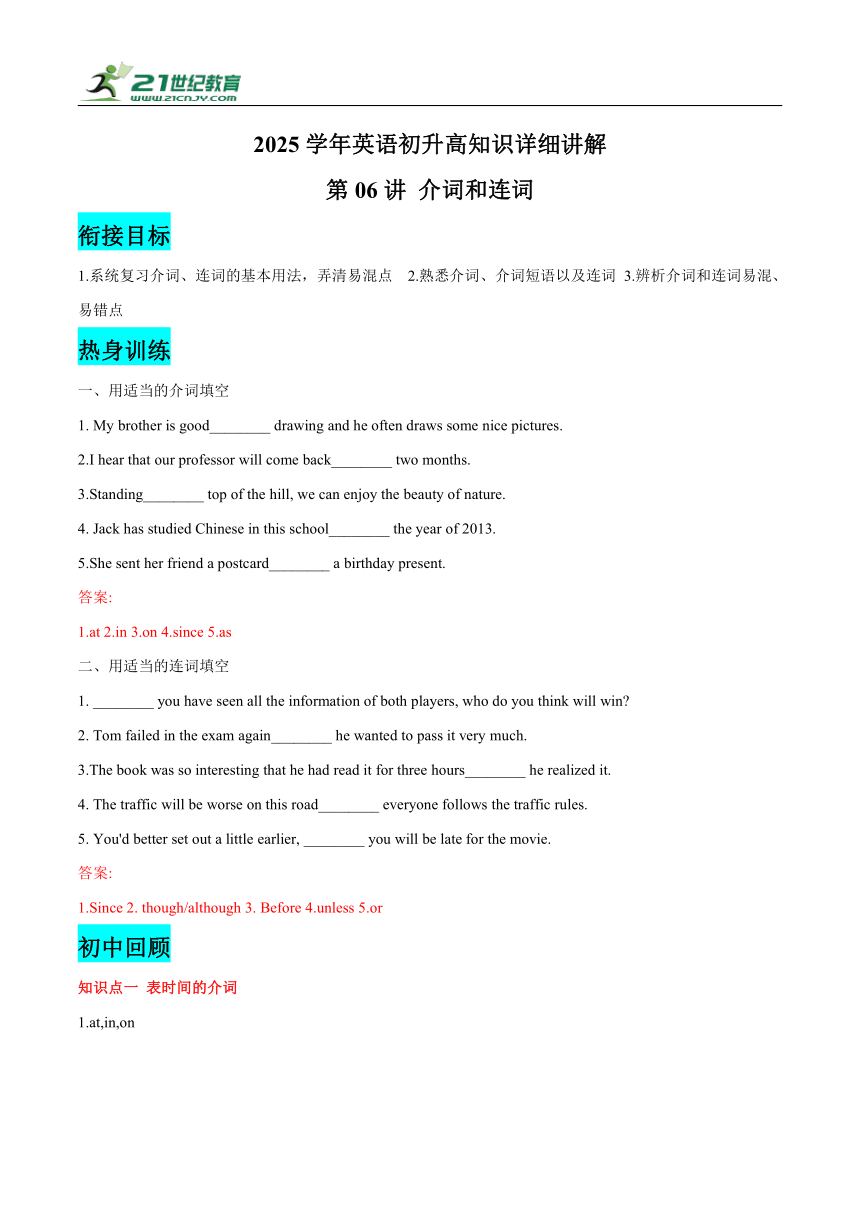 | |
| 格式 | docx | ||
| 文件大小 | 69.6KB | ||
| 资源类型 | 试卷 | ||
| 版本资源 | 人教新目标(Go for it)版 | ||
| 科目 | 英语 | ||
| 更新时间 | 2025-06-20 00:33:53 | ||
图片预览

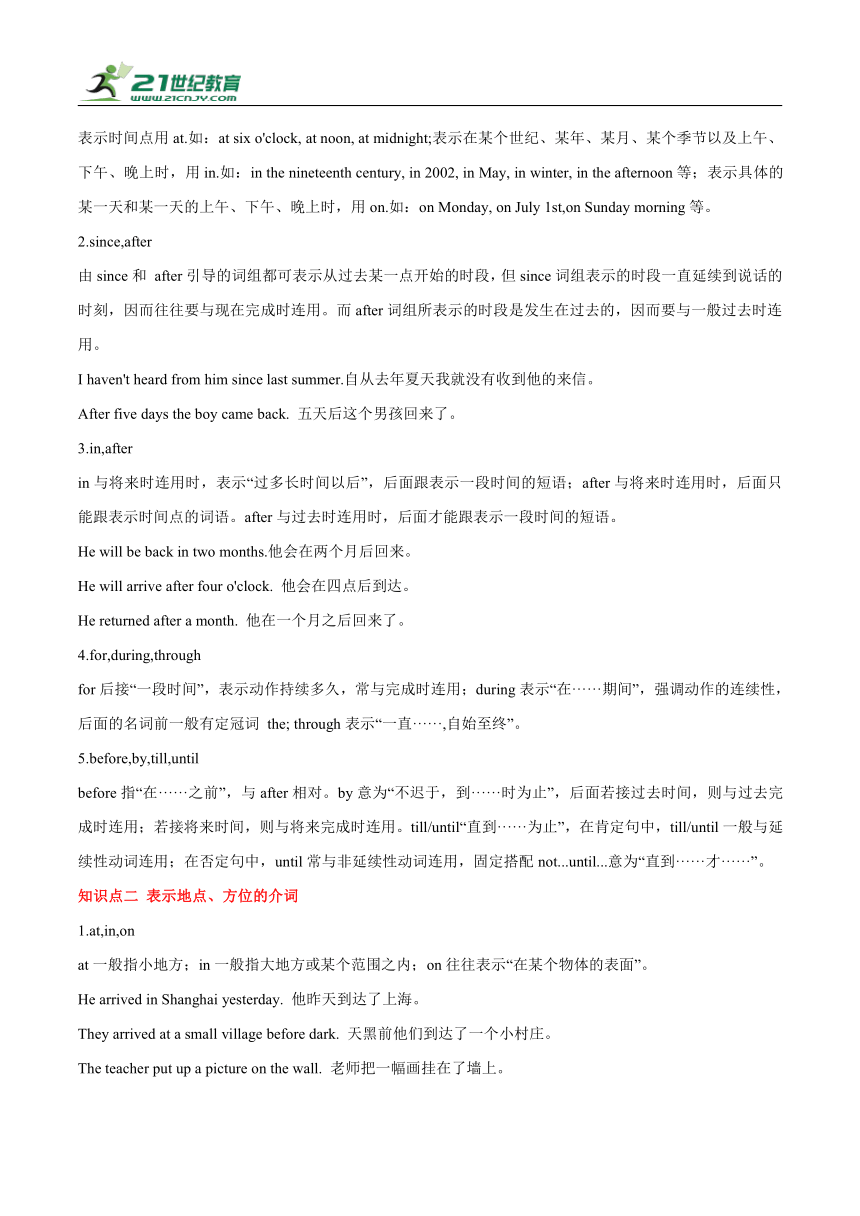
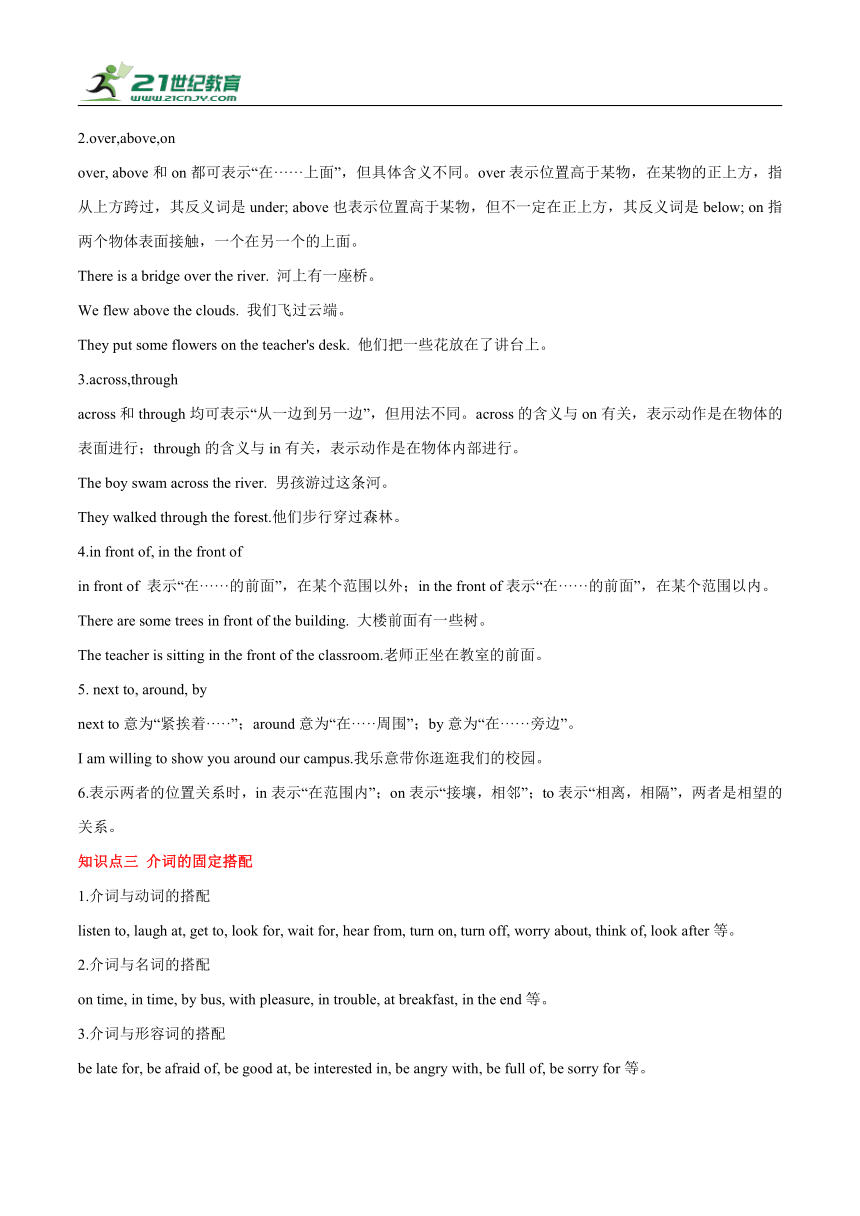
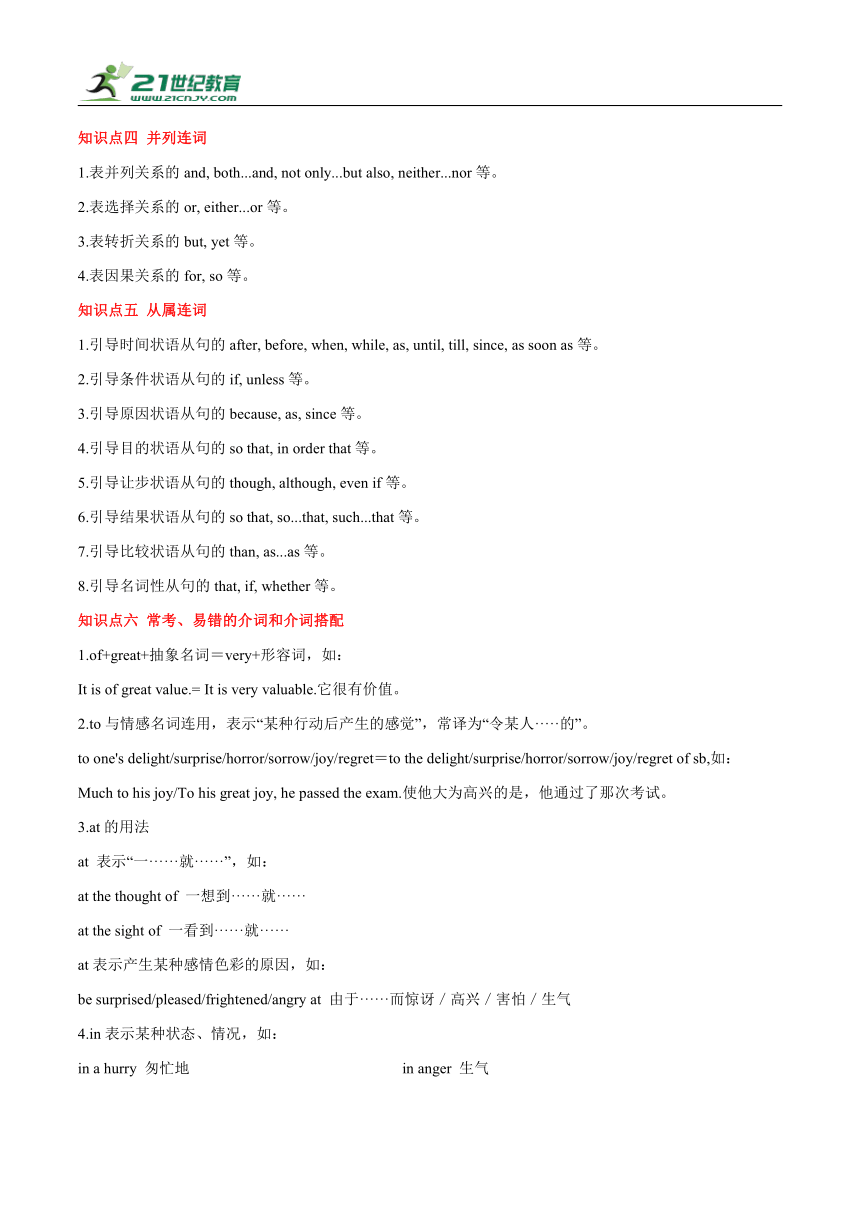
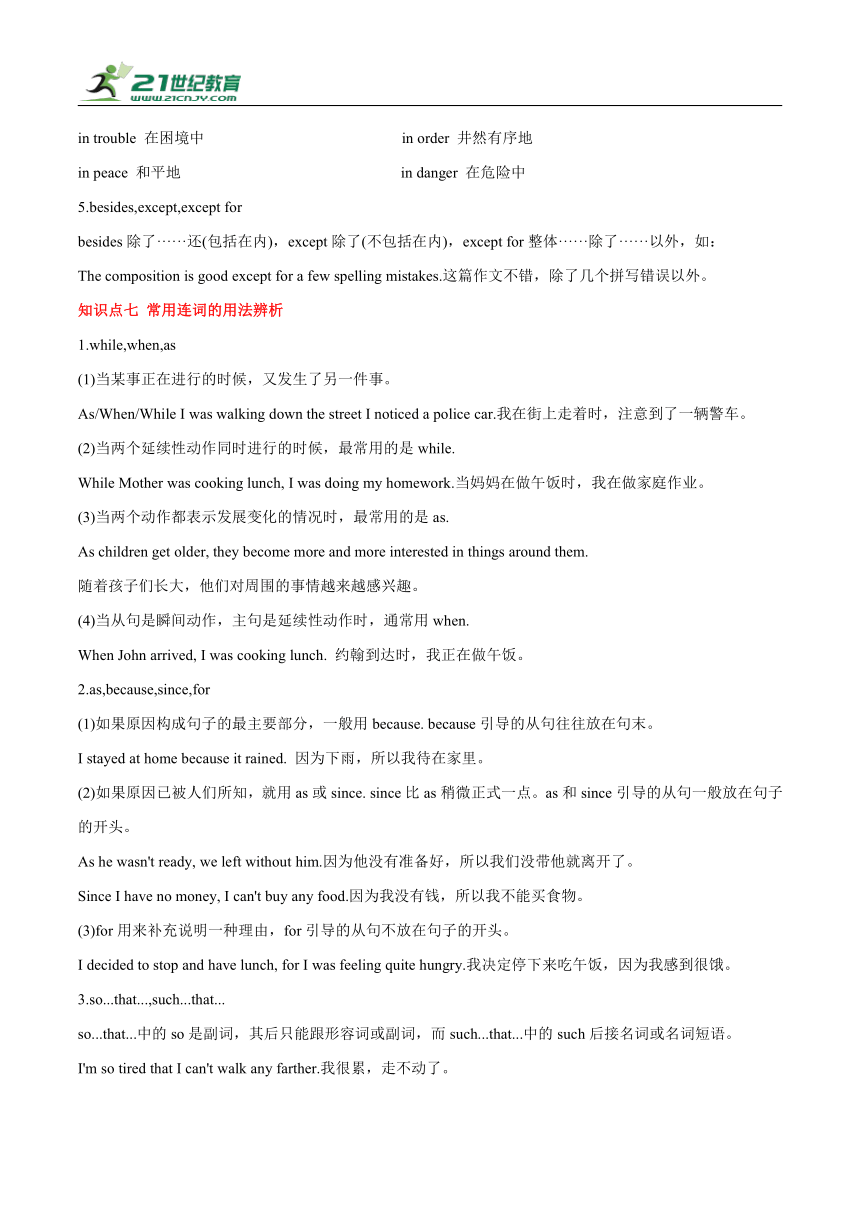
文档简介
2025学年英语初升高知识详细讲解
第06讲 介词和连词
衔接目标
1.系统复习介词、连词的基本用法,弄清易混点 2.熟悉介词、介词短语以及连词 3.辨析介词和连词易混、易错点
热身训练
一、用适当的介词填空
1. My brother is good________ drawing and he often draws some nice pictures.
2.I hear that our professor will come back________ two months.
3.Standing________ top of the hill, we can enjoy the beauty of nature.
4. Jack has studied Chinese in this school________ the year of 2013.
5.She sent her friend a postcard________ a birthday present.
答案:
1.at 2.in 3.on 4.since 5.as
二、用适当的连词填空
1. ________ you have seen all the information of both players, who do you think will win
2. Tom failed in the exam again________ he wanted to pass it very much.
3.The book was so interesting that he had read it for three hours________ he realized it.
4. The traffic will be worse on this road________ everyone follows the traffic rules.
5. You'd better set out a little earlier, ________ you will be late for the movie.
答案:
1.Since 2. though/although 3. Before 4.unless 5.or
初中回顾
知识点一 表时间的介词
1.at,in,on
表示时间点用at.如:at six o'clock, at noon, at midnight;表示在某个世纪、某年、某月、某个季节以及上午、下午、晚上时,用in.如:in the nineteenth century, in 2002, in May, in winter, in the afternoon等;表示具体的某一天和某一天的上午、下午、晚上时,用on.如:on Monday, on July 1st,on Sunday morning等。
2.since,after
由since和 after引导的词组都可表示从过去某一点开始的时段,但since词组表示的时段一直延续到说话的时刻,因而往往要与现在完成时连用。而after词组所表示的时段是发生在过去的,因而要与一般过去时连用。
I haven't heard from him since last summer.自从去年夏天我就没有收到他的来信。
After five days the boy came back. 五天后这个男孩回来了。
3.in,after
in与将来时连用时,表示“过多长时间以后”,后面跟表示一段时间的短语;after与将来时连用时,后面只能跟表示时间点的词语。after与过去时连用时,后面才能跟表示一段时间的短语。
He will be back in two months.他会在两个月后回来。
He will arrive after four o'clock. 他会在四点后到达。
He returned after a month. 他在一个月之后回来了。
4.for,during,through
for后接“一段时间”,表示动作持续多久,常与完成时连用;during表示“在······期间”,强调动作的连续性,后面的名词前一般有定冠词 the; through表示“一直······,自始至终”。
5.before,by,till,until
before指“在······之前”,与after相对。by意为“不迟于,到······时为止”,后面若接过去时间,则与过去完成时连用;若接将来时间,则与将来完成时连用。till/until“直到······为止”,在肯定句中,till/until一般与延续性动词连用;在否定句中,until常与非延续性动词连用,固定搭配not...until...意为“直到······才······”。
知识点二 表示地点、方位的介词
1.at,in,on
at一般指小地方;in一般指大地方或某个范围之内;on往往表示“在某个物体的表面”。
He arrived in Shanghai yesterday. 他昨天到达了上海。
They arrived at a small village before dark. 天黑前他们到达了一个小村庄。
The teacher put up a picture on the wall. 老师把一幅画挂在了墙上。
2.over,above,on
over, above和on都可表示“在······上面”,但具体含义不同。over表示位置高于某物,在某物的正上方,指从上方跨过,其反义词是under; above也表示位置高于某物,但不一定在正上方,其反义词是below; on指两个物体表面接触,一个在另一个的上面。
There is a bridge over the river. 河上有一座桥。
We flew above the clouds. 我们飞过云端。
They put some flowers on the teacher's desk. 他们把一些花放在了讲台上。
3.across,through
across和through均可表示“从一边到另一边”,但用法不同。across的含义与on有关,表示动作是在物体的表面进行;through的含义与in有关,表示动作是在物体内部进行。
The boy swam across the river. 男孩游过这条河。
They walked through the forest.他们步行穿过森林。
4.in front of, in the front of
in front of 表示“在······的前面”,在某个范围以外;in the front of表示“在······的前面”,在某个范围以内。
There are some trees in front of the building. 大楼前面有一些树。
The teacher is sitting in the front of the classroom.老师正坐在教室的前面。
5. next to, around, by
next to意为“紧挨着·····”;around意为“在·····周围”;by意为“在······旁边”。
I am willing to show you around our campus.我乐意带你逛逛我们的校园。
6.表示两者的位置关系时,in表示“在范围内”;on表示“接壤,相邻”;to表示“相离,相隔”,两者是相望的关系。
知识点三 介词的固定搭配
1.介词与动词的搭配
listen to, laugh at, get to, look for, wait for, hear from, turn on, turn off, worry about, think of, look after等。
2.介词与名词的搭配
on time, in time, by bus, with pleasure, in trouble, at breakfast, in the end等。
3.介词与形容词的搭配
be late for, be afraid of, be good at, be interested in, be angry with, be full of, be sorry for等。
知识点四 并列连词
1.表并列关系的and, both...and, not only...but also, neither...nor等。
2.表选择关系的or, either...or等。
3.表转折关系的but, yet等。
4.表因果关系的for, so等。
知识点五 从属连词
1.引导时间状语从句的after, before, when, while, as, until, till, since, as soon as等。
2.引导条件状语从句的if, unless等。
3.引导原因状语从句的because, as, since等。
4.引导目的状语从句的so that, in order that等。
5.引导让步状语从句的though, although, even if等。
6.引导结果状语从句的so that, so...that, such...that等。
7.引导比较状语从句的than, as...as等。
8.引导名词性从句的that, if, whether等。
知识点六 常考、易错的介词和介词搭配
1.of+great+抽象名词=very+形容词,如:
It is of great value.= It is very valuable.它很有价值。
2.to与情感名词连用,表示“某种行动后产生的感觉”,常译为“令某人·····的”。
to one's delight/surprise/horror/sorrow/joy/regret=to the delight/surprise/horror/sorrow/joy/regret of sb,如:
Much to his joy/To his great joy, he passed the exam.使他大为高兴的是,他通过了那次考试。
3.at的用法
at 表示“一······就······”,如:
at the thought of 一想到······就······
at the sight of 一看到······就······
at表示产生某种感彩的原因,如:
be surprised/pleased/frightened/angry at 由于······而惊讶/高兴/害怕/生气
4.in表示某种状态、情况,如:
in a hurry 匆忙地 in anger 生气
in trouble 在困境中 in order 井然有序地
in peace 和平地 in danger 在危险中
5.besides,except,except for
besides除了······还(包括在内),except除了(不包括在内),except for整体······除了······以外,如:
The composition is good except for a few spelling mistakes.这篇作文不错,除了几个拼写错误以外。
知识点七 常用连词的用法辨析
1.while,when,as
(1)当某事正在进行的时候,又发生了另一件事。
As/When/While I was walking down the street I noticed a police car.我在街上走着时,注意到了一辆警车。
(2)当两个延续性动作同时进行的时候,最常用的是while.
While Mother was cooking lunch, I was doing my homework.当妈妈在做午饭时,我在做家庭作业。
(3)当两个动作都表示发展变化的情况时,最常用的是as.
As children get older, they become more and more interested in things around them.
随着孩子们长大,他们对周围的事情越来越感兴趣。
(4)当从句是瞬间动作,主句是延续性动作时,通常用when.
When John arrived, I was cooking lunch. 约翰到达时,我正在做午饭。
2.as,because,since,for
(1)如果原因构成句子的最主要部分,一般用because. because引导的从句往往放在句末。
I stayed at home because it rained. 因为下雨,所以我待在家里。
(2)如果原因已被人们所知,就用as或since. since比as稍微正式一点。as和since引导的从句一般放在句子的开头。
As he wasn't ready, we left without him.因为他没有准备好,所以我们没带他就离开了。
Since I have no money, I can't buy any food.因为我没有钱,所以我不能买食物。
(3)for用来补充说明一种理由,for引导的从句不放在句子的开头。
I decided to stop and have lunch, for I was feeling quite hungry.我决定停下来吃午饭,因为我感到很饿。
3.so...that...,such...that...
so...that...中的so是副词,其后只能跟形容词或副词,而such...that...中的such后接名词或名词短语。
I'm so tired that I can't walk any farther.我很累,走不动了。
It was such a hot day that he went swimming.天那么热,所以他去游泳了。
注意:如果名词前有many, much, little(少),few时,用so,不用such.
He has so little education that he is unable to get a job.他受了那么少的教育,所以找不到工作。
I have had so many falls that I am black and blue all over.我摔了那么多跤,浑身青一块紫一块的。
4.although,but
although能和 yet连用,但不能和but连用。
虽然他60多岁了,但是他和别人一样努力工作。
误:Although he is over sixty, but he works as hard as others.
正:Although he is over sixty, he works as hard as others.
正:He is over sixty, but he works as hard as others.
5.because,so
because和 so不能用在同一个句子中。
因为约翰病了,所以我带他去看医生了。
误:Because John was ill, so I took him to the doctor.
正:Because John was ill, I took him to the doctor.
正:John was ill, so I took him to the doctor.
高中新知
衔接点一 表工具、手段、方式的介词
1.by表示通过某种方式时,用by doing,若后接交通工具类名词时,名词前不加冠词;用in时,名词前要加冠词。
His father often goes to work by car. 他爸爸经常开车去上班。
2.with表示“用某种具体工具、身体的某部分或器官”,with表示用某种工具时,名词前一般有冠词或物主代词。
3.in表示用某种材料或语言。
4.through表示“以······(方法、手段),经由”,后面多接抽象名词。
You can only achieve success through hard work.只有通过努力工作,你才能获得成功。
衔接点二 表价格、比率、速度的介词
1.at表示“按······出售/买进”,可以用来表价值、价格、比率和速度,指单价或代价。
2.for表示“以······价格买,花······钱买”,指总价。
3.by表示“以······计算”,表示度量单位或标准,后面的名词一般用单数;还可以表数量、时间的相差。
4.to表对比,表示“增加/减少到·····.”,也可用于senior, junior, inferior, superior等词后。
Jack is senior to me by five years. 杰克比我大5岁。
衔接点三 表原因的介词
1.for表心理上的原因,常与表喜、怒、哀、乐等抽象名词连用;或为了某一目的。
They talked in whispers for fear of waking their father.他们轻声说话,以免吵醒他们的父亲。
2.at指情感或感觉上变化的原因,意为“因听到或看到······而······”。
3.with指生理或情感受外界影响的原因。
4.by表由于暴力或无意中造成某种结果的原因。
She took your umbrella by mistake.她错拿了你的雨伞。
衔接点四 英汉差异造成的介词误用
1.句尾介词往往由于受到汉语的影响而缺少
误 I don't know which school he studies.
正I don't know which school he studies in.
正 I don't know in which school he studies.
正I don't know where he studies.
误He is the man I just spoke.
正 He is the man I just spoke to.
2.因不熟悉介词的语法功能和不同搭配而造成语句混乱、搭配不当等错误
误 I often come to school take bus, but sometimes I come by my father's car.
正 I often come to school by bus, but sometimes I come in my father's car.
3.英汉差异造成的介词错用
误 He got married with her last month.
正 He got married to her last month.
正 He has a knife wound on the leg.
误He has a knife wound with the leg.
正 He married her last month.
误She drove her heels onto the sand.
正 She drove her heels into the sand.
误 A is different with B.
正 A is different from B.
衔接点五 表并列关系、递进关系或选择关系
表示并列关系的并列连词有and, both...and...等;表示递进关系的并列连词有 not only...but also...,neither...nor...等;表示选择关系的并列连词有or, or else, either...or...等。
You can come either on Saturday or on Sunday.你可以星期六来也可以星期天来。
注意:when也可作并列连词用,其意义为“这时,那时”,相当于and at this/that time,常用于下列句式:
(1)sb was doing sth when...某人正在做某事,突然······
(2)sb was about to do/on the point of doing sth when... 某人刚要做某事,突然······
(3)sb had just done sth when... 某人刚做完/一做完某事就······
I was about to go out when the telephone rang.我正要出门,这时电话响了。
We were having a meeting when he broke in.当时我们正在开会,突然他闯了进来。
I had just left when it began to rain. 我刚走,天就开始下雨了。
衔接点六 表转折关系、因果关系或对比关系
表示转折关系的并列连词有but, yet等;表示因果关系的并列连词有so, for等;表示对比关系的并列连词有while等。
We were very tired but very happy.我们非常累,但是非常开心。
He is a driver while I'm a teacher.他是一名司机,而我是一名老师。
衔接点七 名词词组作连词引导状语从句
主要有every time(每次),each time(每次),(the)next time(下次),any time(随时),(the)last time(上次),the first time(第一次)。
Each/Every time I was in trouble, he would come to help me.每次我处于困境时,他就会来帮助我。
The last time she saw James, he was reading a detective novel.
上次她看见詹姆斯的时候,他正在读一本侦探小说。
巩固训练
一、在空白处填入适当的内容(每空1词)
A组(介词)
1. The weather is getting warm_________ spring. Don't stay inside_________ such a sunny day.
2. As we know, a person learns many things_________ making mistakes and correcting them.
3. Jane listened to her grandma_________ a happy expression.
4.He made an apology_________ her_________ hurting her feelings.
5.He is a very good boy, _________ _________ naughtiness(淘气)。
答案:
1.in;on 2.by/through 3. With 4.to;for 5.except for
B组(连词)
1. My friend helps to bring out the best in me_________ we have disagreements sometimes.
2. It's important for us students to make a plan for studying_________ the new term begins.
3. _________ the coolest winter is coming in Britain, electronic heating products made in China have become best sellers there last year.
4.Mr Green will go on a picnic this Sunday_________ the weather is bad.
5. There may be difficulties but I think you should keep on working_________ you achieve your goal.
答案:
1.although 2.before 3.As 4. unless 5.until
二、完成句子
A组(介词)
1.你在接受此项挑战前得要三思。
You have to__________________ this challenge.
2.玛丽擅长数学,她总能用不同的方法解答难题。
Mary is good at Maths and she can solve the difficult problems__________________.
3.就假期来说,许多人都去参观远离澳大利亚海岸的那些岛屿。
For holidays, many people visit those islands__________________ Australia.
4.课间经常播放欢快的音乐,让学生们放松一会儿。
Pleasant music is often__________________ to make students relaxed for a while.
5.这个男人在山中旅游时被一块石头击中了头部。
The man was hit__________________ while travelling in the mountain.
答案:
1.think twice before taking on 2.in different ways/methods
3.off the coast of 4. played between classes 5.on the head by a stone
B组(连词)
1.你随时都可以给我打电话。
You can call me__________________ you want to.
2.我常常会忘事,除非我把它们记下来。
I tend to forget things__________________.
3.虽然你很担心,但是你还是需要等到明天才能拿到结果。
__________________, you still need to__________________ tomorrow to get the result.
4.她一站起来,就感到天旋地转。
Her head spins dizzily__________________.
5.如果你不赶紧,你就要开会迟到了。
__________________, you'll be late for the meeting.
答案:
1.any time 2.unless I mark them down 3. Although you are worried; wait until
4. as soon as she stands up 5. Unless you hurry/If you don't hurry
第06讲 介词和连词
衔接目标
1.系统复习介词、连词的基本用法,弄清易混点 2.熟悉介词、介词短语以及连词 3.辨析介词和连词易混、易错点
热身训练
一、用适当的介词填空
1. My brother is good________ drawing and he often draws some nice pictures.
2.I hear that our professor will come back________ two months.
3.Standing________ top of the hill, we can enjoy the beauty of nature.
4. Jack has studied Chinese in this school________ the year of 2013.
5.She sent her friend a postcard________ a birthday present.
答案:
1.at 2.in 3.on 4.since 5.as
二、用适当的连词填空
1. ________ you have seen all the information of both players, who do you think will win
2. Tom failed in the exam again________ he wanted to pass it very much.
3.The book was so interesting that he had read it for three hours________ he realized it.
4. The traffic will be worse on this road________ everyone follows the traffic rules.
5. You'd better set out a little earlier, ________ you will be late for the movie.
答案:
1.Since 2. though/although 3. Before 4.unless 5.or
初中回顾
知识点一 表时间的介词
1.at,in,on
表示时间点用at.如:at six o'clock, at noon, at midnight;表示在某个世纪、某年、某月、某个季节以及上午、下午、晚上时,用in.如:in the nineteenth century, in 2002, in May, in winter, in the afternoon等;表示具体的某一天和某一天的上午、下午、晚上时,用on.如:on Monday, on July 1st,on Sunday morning等。
2.since,after
由since和 after引导的词组都可表示从过去某一点开始的时段,但since词组表示的时段一直延续到说话的时刻,因而往往要与现在完成时连用。而after词组所表示的时段是发生在过去的,因而要与一般过去时连用。
I haven't heard from him since last summer.自从去年夏天我就没有收到他的来信。
After five days the boy came back. 五天后这个男孩回来了。
3.in,after
in与将来时连用时,表示“过多长时间以后”,后面跟表示一段时间的短语;after与将来时连用时,后面只能跟表示时间点的词语。after与过去时连用时,后面才能跟表示一段时间的短语。
He will be back in two months.他会在两个月后回来。
He will arrive after four o'clock. 他会在四点后到达。
He returned after a month. 他在一个月之后回来了。
4.for,during,through
for后接“一段时间”,表示动作持续多久,常与完成时连用;during表示“在······期间”,强调动作的连续性,后面的名词前一般有定冠词 the; through表示“一直······,自始至终”。
5.before,by,till,until
before指“在······之前”,与after相对。by意为“不迟于,到······时为止”,后面若接过去时间,则与过去完成时连用;若接将来时间,则与将来完成时连用。till/until“直到······为止”,在肯定句中,till/until一般与延续性动词连用;在否定句中,until常与非延续性动词连用,固定搭配not...until...意为“直到······才······”。
知识点二 表示地点、方位的介词
1.at,in,on
at一般指小地方;in一般指大地方或某个范围之内;on往往表示“在某个物体的表面”。
He arrived in Shanghai yesterday. 他昨天到达了上海。
They arrived at a small village before dark. 天黑前他们到达了一个小村庄。
The teacher put up a picture on the wall. 老师把一幅画挂在了墙上。
2.over,above,on
over, above和on都可表示“在······上面”,但具体含义不同。over表示位置高于某物,在某物的正上方,指从上方跨过,其反义词是under; above也表示位置高于某物,但不一定在正上方,其反义词是below; on指两个物体表面接触,一个在另一个的上面。
There is a bridge over the river. 河上有一座桥。
We flew above the clouds. 我们飞过云端。
They put some flowers on the teacher's desk. 他们把一些花放在了讲台上。
3.across,through
across和through均可表示“从一边到另一边”,但用法不同。across的含义与on有关,表示动作是在物体的表面进行;through的含义与in有关,表示动作是在物体内部进行。
The boy swam across the river. 男孩游过这条河。
They walked through the forest.他们步行穿过森林。
4.in front of, in the front of
in front of 表示“在······的前面”,在某个范围以外;in the front of表示“在······的前面”,在某个范围以内。
There are some trees in front of the building. 大楼前面有一些树。
The teacher is sitting in the front of the classroom.老师正坐在教室的前面。
5. next to, around, by
next to意为“紧挨着·····”;around意为“在·····周围”;by意为“在······旁边”。
I am willing to show you around our campus.我乐意带你逛逛我们的校园。
6.表示两者的位置关系时,in表示“在范围内”;on表示“接壤,相邻”;to表示“相离,相隔”,两者是相望的关系。
知识点三 介词的固定搭配
1.介词与动词的搭配
listen to, laugh at, get to, look for, wait for, hear from, turn on, turn off, worry about, think of, look after等。
2.介词与名词的搭配
on time, in time, by bus, with pleasure, in trouble, at breakfast, in the end等。
3.介词与形容词的搭配
be late for, be afraid of, be good at, be interested in, be angry with, be full of, be sorry for等。
知识点四 并列连词
1.表并列关系的and, both...and, not only...but also, neither...nor等。
2.表选择关系的or, either...or等。
3.表转折关系的but, yet等。
4.表因果关系的for, so等。
知识点五 从属连词
1.引导时间状语从句的after, before, when, while, as, until, till, since, as soon as等。
2.引导条件状语从句的if, unless等。
3.引导原因状语从句的because, as, since等。
4.引导目的状语从句的so that, in order that等。
5.引导让步状语从句的though, although, even if等。
6.引导结果状语从句的so that, so...that, such...that等。
7.引导比较状语从句的than, as...as等。
8.引导名词性从句的that, if, whether等。
知识点六 常考、易错的介词和介词搭配
1.of+great+抽象名词=very+形容词,如:
It is of great value.= It is very valuable.它很有价值。
2.to与情感名词连用,表示“某种行动后产生的感觉”,常译为“令某人·····的”。
to one's delight/surprise/horror/sorrow/joy/regret=to the delight/surprise/horror/sorrow/joy/regret of sb,如:
Much to his joy/To his great joy, he passed the exam.使他大为高兴的是,他通过了那次考试。
3.at的用法
at 表示“一······就······”,如:
at the thought of 一想到······就······
at the sight of 一看到······就······
at表示产生某种感彩的原因,如:
be surprised/pleased/frightened/angry at 由于······而惊讶/高兴/害怕/生气
4.in表示某种状态、情况,如:
in a hurry 匆忙地 in anger 生气
in trouble 在困境中 in order 井然有序地
in peace 和平地 in danger 在危险中
5.besides,except,except for
besides除了······还(包括在内),except除了(不包括在内),except for整体······除了······以外,如:
The composition is good except for a few spelling mistakes.这篇作文不错,除了几个拼写错误以外。
知识点七 常用连词的用法辨析
1.while,when,as
(1)当某事正在进行的时候,又发生了另一件事。
As/When/While I was walking down the street I noticed a police car.我在街上走着时,注意到了一辆警车。
(2)当两个延续性动作同时进行的时候,最常用的是while.
While Mother was cooking lunch, I was doing my homework.当妈妈在做午饭时,我在做家庭作业。
(3)当两个动作都表示发展变化的情况时,最常用的是as.
As children get older, they become more and more interested in things around them.
随着孩子们长大,他们对周围的事情越来越感兴趣。
(4)当从句是瞬间动作,主句是延续性动作时,通常用when.
When John arrived, I was cooking lunch. 约翰到达时,我正在做午饭。
2.as,because,since,for
(1)如果原因构成句子的最主要部分,一般用because. because引导的从句往往放在句末。
I stayed at home because it rained. 因为下雨,所以我待在家里。
(2)如果原因已被人们所知,就用as或since. since比as稍微正式一点。as和since引导的从句一般放在句子的开头。
As he wasn't ready, we left without him.因为他没有准备好,所以我们没带他就离开了。
Since I have no money, I can't buy any food.因为我没有钱,所以我不能买食物。
(3)for用来补充说明一种理由,for引导的从句不放在句子的开头。
I decided to stop and have lunch, for I was feeling quite hungry.我决定停下来吃午饭,因为我感到很饿。
3.so...that...,such...that...
so...that...中的so是副词,其后只能跟形容词或副词,而such...that...中的such后接名词或名词短语。
I'm so tired that I can't walk any farther.我很累,走不动了。
It was such a hot day that he went swimming.天那么热,所以他去游泳了。
注意:如果名词前有many, much, little(少),few时,用so,不用such.
He has so little education that he is unable to get a job.他受了那么少的教育,所以找不到工作。
I have had so many falls that I am black and blue all over.我摔了那么多跤,浑身青一块紫一块的。
4.although,but
although能和 yet连用,但不能和but连用。
虽然他60多岁了,但是他和别人一样努力工作。
误:Although he is over sixty, but he works as hard as others.
正:Although he is over sixty, he works as hard as others.
正:He is over sixty, but he works as hard as others.
5.because,so
because和 so不能用在同一个句子中。
因为约翰病了,所以我带他去看医生了。
误:Because John was ill, so I took him to the doctor.
正:Because John was ill, I took him to the doctor.
正:John was ill, so I took him to the doctor.
高中新知
衔接点一 表工具、手段、方式的介词
1.by表示通过某种方式时,用by doing,若后接交通工具类名词时,名词前不加冠词;用in时,名词前要加冠词。
His father often goes to work by car. 他爸爸经常开车去上班。
2.with表示“用某种具体工具、身体的某部分或器官”,with表示用某种工具时,名词前一般有冠词或物主代词。
3.in表示用某种材料或语言。
4.through表示“以······(方法、手段),经由”,后面多接抽象名词。
You can only achieve success through hard work.只有通过努力工作,你才能获得成功。
衔接点二 表价格、比率、速度的介词
1.at表示“按······出售/买进”,可以用来表价值、价格、比率和速度,指单价或代价。
2.for表示“以······价格买,花······钱买”,指总价。
3.by表示“以······计算”,表示度量单位或标准,后面的名词一般用单数;还可以表数量、时间的相差。
4.to表对比,表示“增加/减少到·····.”,也可用于senior, junior, inferior, superior等词后。
Jack is senior to me by five years. 杰克比我大5岁。
衔接点三 表原因的介词
1.for表心理上的原因,常与表喜、怒、哀、乐等抽象名词连用;或为了某一目的。
They talked in whispers for fear of waking their father.他们轻声说话,以免吵醒他们的父亲。
2.at指情感或感觉上变化的原因,意为“因听到或看到······而······”。
3.with指生理或情感受外界影响的原因。
4.by表由于暴力或无意中造成某种结果的原因。
She took your umbrella by mistake.她错拿了你的雨伞。
衔接点四 英汉差异造成的介词误用
1.句尾介词往往由于受到汉语的影响而缺少
误 I don't know which school he studies.
正I don't know which school he studies in.
正 I don't know in which school he studies.
正I don't know where he studies.
误He is the man I just spoke.
正 He is the man I just spoke to.
2.因不熟悉介词的语法功能和不同搭配而造成语句混乱、搭配不当等错误
误 I often come to school take bus, but sometimes I come by my father's car.
正 I often come to school by bus, but sometimes I come in my father's car.
3.英汉差异造成的介词错用
误 He got married with her last month.
正 He got married to her last month.
正 He has a knife wound on the leg.
误He has a knife wound with the leg.
正 He married her last month.
误She drove her heels onto the sand.
正 She drove her heels into the sand.
误 A is different with B.
正 A is different from B.
衔接点五 表并列关系、递进关系或选择关系
表示并列关系的并列连词有and, both...and...等;表示递进关系的并列连词有 not only...but also...,neither...nor...等;表示选择关系的并列连词有or, or else, either...or...等。
You can come either on Saturday or on Sunday.你可以星期六来也可以星期天来。
注意:when也可作并列连词用,其意义为“这时,那时”,相当于and at this/that time,常用于下列句式:
(1)sb was doing sth when...某人正在做某事,突然······
(2)sb was about to do/on the point of doing sth when... 某人刚要做某事,突然······
(3)sb had just done sth when... 某人刚做完/一做完某事就······
I was about to go out when the telephone rang.我正要出门,这时电话响了。
We were having a meeting when he broke in.当时我们正在开会,突然他闯了进来。
I had just left when it began to rain. 我刚走,天就开始下雨了。
衔接点六 表转折关系、因果关系或对比关系
表示转折关系的并列连词有but, yet等;表示因果关系的并列连词有so, for等;表示对比关系的并列连词有while等。
We were very tired but very happy.我们非常累,但是非常开心。
He is a driver while I'm a teacher.他是一名司机,而我是一名老师。
衔接点七 名词词组作连词引导状语从句
主要有every time(每次),each time(每次),(the)next time(下次),any time(随时),(the)last time(上次),the first time(第一次)。
Each/Every time I was in trouble, he would come to help me.每次我处于困境时,他就会来帮助我。
The last time she saw James, he was reading a detective novel.
上次她看见詹姆斯的时候,他正在读一本侦探小说。
巩固训练
一、在空白处填入适当的内容(每空1词)
A组(介词)
1. The weather is getting warm_________ spring. Don't stay inside_________ such a sunny day.
2. As we know, a person learns many things_________ making mistakes and correcting them.
3. Jane listened to her grandma_________ a happy expression.
4.He made an apology_________ her_________ hurting her feelings.
5.He is a very good boy, _________ _________ naughtiness(淘气)。
答案:
1.in;on 2.by/through 3. With 4.to;for 5.except for
B组(连词)
1. My friend helps to bring out the best in me_________ we have disagreements sometimes.
2. It's important for us students to make a plan for studying_________ the new term begins.
3. _________ the coolest winter is coming in Britain, electronic heating products made in China have become best sellers there last year.
4.Mr Green will go on a picnic this Sunday_________ the weather is bad.
5. There may be difficulties but I think you should keep on working_________ you achieve your goal.
答案:
1.although 2.before 3.As 4. unless 5.until
二、完成句子
A组(介词)
1.你在接受此项挑战前得要三思。
You have to__________________ this challenge.
2.玛丽擅长数学,她总能用不同的方法解答难题。
Mary is good at Maths and she can solve the difficult problems__________________.
3.就假期来说,许多人都去参观远离澳大利亚海岸的那些岛屿。
For holidays, many people visit those islands__________________ Australia.
4.课间经常播放欢快的音乐,让学生们放松一会儿。
Pleasant music is often__________________ to make students relaxed for a while.
5.这个男人在山中旅游时被一块石头击中了头部。
The man was hit__________________ while travelling in the mountain.
答案:
1.think twice before taking on 2.in different ways/methods
3.off the coast of 4. played between classes 5.on the head by a stone
B组(连词)
1.你随时都可以给我打电话。
You can call me__________________ you want to.
2.我常常会忘事,除非我把它们记下来。
I tend to forget things__________________.
3.虽然你很担心,但是你还是需要等到明天才能拿到结果。
__________________, you still need to__________________ tomorrow to get the result.
4.她一站起来,就感到天旋地转。
Her head spins dizzily__________________.
5.如果你不赶紧,你就要开会迟到了。
__________________, you'll be late for the meeting.
答案:
1.any time 2.unless I mark them down 3. Although you are worried; wait until
4. as soon as she stands up 5. Unless you hurry/If you don't hurry
同课章节目录
